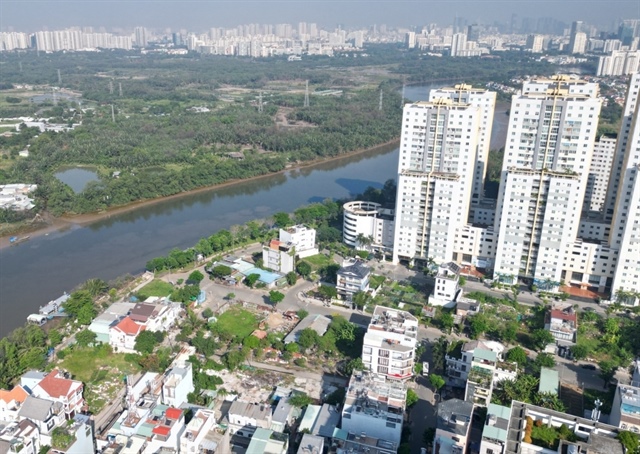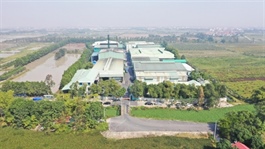Rising property prices push homebuyers towards long-term renting
Rising property prices push homebuyers towards long-term renting
Rising property prices in Vietnam’s major cities are reshaping homeownership aspirations, with long-term renting emerging as a viable alternative.
Housing affordability in Hanoi and Ho Chi Minh City has reached a critical point, prompting a generational shift in attitudes towards owning a home. Traditionally viewed as essential for stability and social status, homeownership is increasingly unreachable as prices soar faster than incomes. According to the Vietnam Association of Real Estate Brokers, apartment prices in Hanoi have climbed more than 72 per cent over the past five years, while in Ho Chi Minh City, they have risen nearly 30 per cent.

Rocketing house price in major cities force young generation to lease instead of buying. Photo: Le Toan |
For decades, buying a home has been seen as essential to stability and social status. Yet, as prices continue to rise far faster than incomes evolve, long-term renting has become an alternative option and a popular lifestyle choice.
Further compounding the difficulty, while prices have risen, average incomes have grown only 6-10 per cent annually over the same period, leaving a widening gap between what people earn and what they need to buy a home.
In the first eight months of 2025, Savills Vietnam reported that the average primary apartment price in Hanoi stood at about $3,500 per square metre, an increase of 40 per cent on-year.
In Tay Ho and My Dinh areas, new projects are marketed at around $4,600-6,000 per sq.m. Even areas further from the centre, such as Gia Lam or Dong Anh located near Long Bien bridge, are no longer considered affordable, with developments priced at $2,700-5,400 per sq.m.
In practice, this places the typical two-bedroom apartment firmly out of reach for most young professionals. A mid-level office worker with a monthly income of $960-1,150 is confronted with prices of $154,000-192,000 for an average unit, a level that far exceeds any sustainable mortgage ratio.
“If I tried to buy now, my mortgage repayments would consume most of my income for decades,” said Nguyen Thu Ha, 30, a financial analyst in Hanoi. “Renting is the only way I can maintain a reasonable quality of life.”
Duong Thuy Dung, executive director of CBRE Vietnam, said this has led to a visible shift in behaviour.
“Many young professionals moving to Ho Chi Minh City initially want to live in what was called District 1, but prices there are unaffordable. Even renting in the former District 1 is difficult, so they often move to surrounding wards. Young families also tend to rent first to see which neighbourhood best suits their long-term needs,” Dung added.
For some, renting is not merely a temporary compromise but a deliberate financial strategy. Le Quang Huy, 27 and a software engineer living in Ho Chi Minh City, said that he would rather rent and use savings to invest in skills and opportunities.
“Owning a home now would only tie me down. Renting gives me flexibility to change jobs or even more cities if better opportunities come along,” Huy said.
This shift illustrates a deeper cultural transformation. While older generations equated stability with property ownership, younger people increasingly value flexibility, mobility, and financial freedom. Many have been exposed to international rental cultures in Europe and United States, where renting is viewed as a normal, long-term option.
However, the supply side of Vietnam’s rental market tells a different story. A professional build-to-rent sector is almost non-existent, and most tenants lease from private individuals who bought units to let, creating a fragmented and often inconsistent market.
On September 25, Deputy Prime Minister Tran Hong Ha chaired a meeting to review a draft decree on pilot mechanisms for developing social housing.
Under the proposal, a fund would focus on investing in and creating homes for rent. Its financing would come from the state budget, alongside voluntary contributions, donations from domestic and international organisations and individual, and other lawful sources.
This initiative addresses a fundamental structural problem in Vietnam's housing market.
“In developed countries, developers build residential projects specifically for rental, often with government support, ensuring a stable supply,” Dung from CBRE further explained. “In Vietnam, developers build to sell, and renters depend on individual landlords. That means fewer options, higher costs, and little professional management.”
Dung added that opportunities are emerging for developers and investors to respond. Rising demand for potentially rent-to-own schemes points to new market potential. But without supportive policies, such as tax incentives, deferred land-use fees, or legal frameworks for long-term leases, developers will continue to prioritise sales.
“If developers are not given incentives, they will always choose to sell,” Dung from CBRE said. “Limiting speculative activity in the ownership market could also help, encouraging developers to create housing that meets real demand, whether for ownership or for rental.”
Vu Thi Thuong, lecturer at Vietnam National University Hanoi, said the movement from buying to renting is a rational adjustment to market realities.
“Housing prices in major cities have risen to the point where many young people simply cannot buy. Renting is a necessary solution, allowing them to continue living and working in urban centres. It shows a structural mismatch between supply and affordability,” Thuong said.
- 19:02 13/10/2025




























